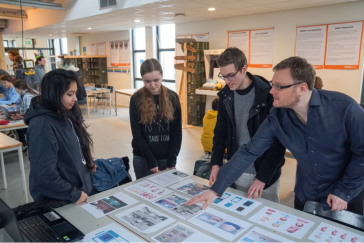Original sin is only a poor stimulator of behaviour change. It's easy to understand that it seems rather unfair to blame a new-born for the major problems that humanity faces after several centuries of technological progress. That also applies to all those natural peoples, who lived in harmony with their environment, where the concept of Earth Overshoot Day did not apply at all. In this article it is argued that insights from applied psychology can help to pay off the debts in terms of behavioral change.
MULTIFILE

This is the first of a series of four articles on psychological foundations from an applied psychological perspective. To begin with, the psychology of give and take, which is contradictory in its application, like many basic psychological mechanisms: sometimes emphasized, sometimes denied. In this first article it is argued that humans are equipped with a psychological reciprocity mechanism that constantly judges whether give and take in the social group we belong to is in balance (reciprocal altruism: favour others at their own expense, because it is later repaid). On the other hand, sometimes it is necessary to hide inequalities in give and take, especially in a complex hierarchical society.
MULTIFILE

In this series on psychological foundations from an applied psychological perspective, we focus this time on shame, guilt and sin. Shame, guilt and sin share that all three are strong motivators for behavioural change. However, we can respond to them in very different ways. In this article it is argued that original sin is a variant of guilt and misfortune, that seems unfair: how can a new born child be blamed for being born in an unbalanced world? Denial is a common reaction to original sin, while this form of guilt plays a major role in our technological ostrich policy.
MULTIFILE

Postdoc research project Transformation through Interactive Narrative DesignMedia psychologist dr. Christian Roth's postdoc project Transformation through Interactive Narrative Design (TIND) is part of the Professorship Performative Creative Processes, the school Games & Interaction, and the Expertisecentrum Onderzoek, Innovatie en Internationalisering (OOI). Here, Christian interweaves education and practice-oriented research. He studies the artistic, pedagogical and academic perspectives regarding the power of transformation through applied Interactive Narrative Design (IND).Within the two-year postdoc research project TIND, Christian studies the training of interactive narrative designers with the goal of developing teaching methods and learning tools for artists and designers, such as game and interaction designers, to enable them to create more effective artefacts.Why interactive narrative design?IND offers agency, defined as the ability to influence narrative progression and outcomes in a meaningful way. As such, it carries the potential to create and emotional impact and spark transformative change. This enables interactors to explore different points of view and to feel the weight of their own choices and consequences. This, in turn, allows for a more thorough understanding of complex multi-stakeholder issues, which could have a significant impact on the success of emerging artistic, and learning applications.The TIND project will enable designers through an interdisciplinary approach, including applied game design, immersive theatre, behavioral and cognitive psychology, and the learning sciences.A good example for offering different perspectives on a complex topic is the narrative simulation Mission Zhobia: Winning the Peace, which is used for the training of peacekeepers. Or the news game, I am Mosul, which aims to raise awareness around the effects of war by bringing it close to home: choose your Dutch city and make choices on how to survive if the war was there. And the interactive story Adventures with Anxiety offers a new understanding by letting interactors play anxiety embodied within a wolf. IND is a complex and challenging interdisciplinary field in which design knowledge from other media can often not be directly transferred. As a new medium, it introduces new affordances in technique and user experience. This requires practice-based research for further development of the educational format, demonstrating its potential while identifying and overcoming common learners’ challenges. This project aims to develop a framework for the design and evaluation of meaningful interactive narrative experiences that effectively stimulate a variety of cognitive and emotional responses such as reflection, insight, understanding, and potential behavior change. It provides tools, methods and activities to enable aspiring or practicing narrative designers through an interdisciplinary approach, including game design, immersive theatre, behavioral and cognitive psychology, and the learning sciences.HKU education means to prepare students for success in the creative industries and IND plays an important role for current and future jobs in education, arts and entertainment. IND has the potential to create an emotional impact and spark transformative change by offering agency, defined as the ability to influence narrative progression and outcomes in a meaningful way. This enables interactors to feel the weight of their own choices and their consequences, to explore different perspectives, and to more thoroughly understand complex multi-stakeholder issues, which could have significant impact on the success of emerging artistic, and learning applications.The planned output is a collection of design tools and methods for interdisciplinary workshops and courses, which can be integrated into different curricula at the HKU, thereby enhancing existing programs while enabling the refinement of training methods. Once completed, this postdoc project delivers a training method with multiple applications designed to harness the power of interactive storytelling for transformative personal and societal impact.ColloborationsThe research project is directly embedded in the curriculum of the HKU schoolGames & Interaction with annual educational offerings such as the Minor Interactive Narrative Design (MIND) and HKU wide broad seminars. Course evaluation and literature research will be used to create new and adjusted training for different HKU schools and the industry.More informationAre you interested to learn more about the postdoc research project Transformation through Interactive Narrative Design? Get in touch with Christian Roth: christian.roth@hku.nl
